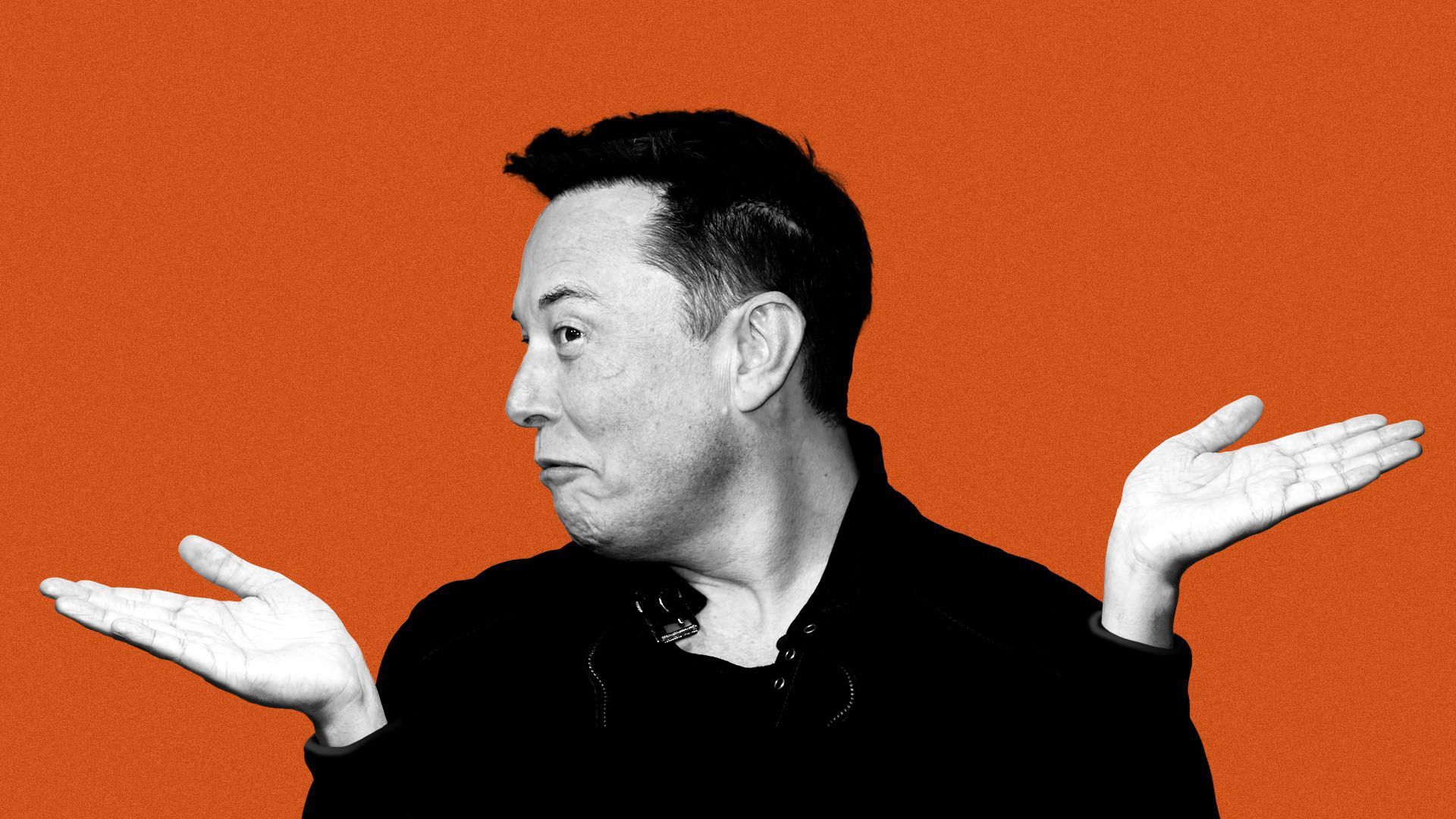| | | | | | | | | | | Axios Markets | | By Emily Peck and Matt Phillips · Apr 26, 2022 | | 🙀 Hiya, friends, it's Emily. And, well, that was fast. Elon Musk's funding was apparently secure enough for the Twitter board, and now the company is someone else's problem to manage, Axios' Dan Primack writes. Today's newsletter, edited by Kate Marino, is 1,207 words, 5 minutes. We bring you loads of Twitter takes. Plus, I wrote about corporate income tax and Kate brings an update from the hedge fund world. Let's go! | | | | | | 1 big thing: Lowest taxes in the Fortune 100 |  Data: Center for American Progress analysis of company 10-K filings; Chart: Baidi Wang/Axios Nineteen of the biggest companies in the U.S. paid very little in federal income tax last year, according to a new report provided exclusively to Axios by the progressive Center for American Progress, Emily writes. - Four companies paid less than zero, including AT&T, Charter Communications, American International Group and Dow Inc.
Why it matters: Corporate profits surged to record highs last year, thanks in part to copious amounts of government spending. The idea of companies that earned billions not paying federal tax is sure to fuel calls for reform, but White House proposals to raise corporate taxes have largely gone nowhere. - "These are huge profitable corporations, and they hardly pay any taxes," said Seth Hanlon, a senior fellow at American Progress who co-authored the report. "It's a glaring sign that something is wrong with the tax system."
The backstory: Companies have been paying lower taxes since the 2017 passage of President Trump's signature Tax Cuts and Jobs Act, which cut the official rate to 21% from 35%. - The 19 companies on CAP's list based on the Fortune 100 all paid an effective rate below 10% — or less than half the official rate.
State of play: Companies don't have to publicly release their income tax filings. This report — and others like it over the years — relies on public companies' annual 10-K filings, where they estimate a "federal income tax expense," or the money they will pay to Uncle Sam. - The analysis doesn't include deferred taxes — they haven't actually been paid yet. And it doesn't include foreign taxes.
- Some of the companies on the list argue this methodology distorts the findings.
Flashback: Last year, the Institute on Taxation and Economic Policy found that 55 companies on the Fortune 500 list paid no taxes. How it works: Companies reduce their tax bill, just like many of us, by taking deductions. Some popular ones, according to Matthew Gardner, a senior fellow at ITEP... - Tax breaks for capital investments: The 2017 tax law increased the amount a company can write off when it spends money on corporate infrastructure, or the tangible stuff it needs to conduct its business.
- Research and development: This is a big one in the tech sector, Gardner says. Along with capital investments, this is the type of spending that companies would do regardless of tax implications, in order to survive.
- Stock options: Companies can write off the market value of stock options that employees exercise.
What they're saying: Axios reached out to all 19 companies on the list and most that responded said they pay what they're supposed to pay. Keep reading for responses from the companies. |     | | | | | | 2. Catch up quick | | 🏦 Fidelity to allow customers to add bitcoin to 401(k) accounts. (WSJ) 🎯 Blackstone targets public REITs. (FT) 📈 4 in 10 small businesses plan to raise prices at least 10%. (Bloomberg) |     | | | | | | 3. Muskapalooza: Twitter takes, in brief |  | | | Photo illustration: Sarah Grillo/Axios. Photo: Liesa Johannssen-Koppitz/Bloomberg via Getty Images | | | | Markets readers know already that Twitter said Yes to Elon Musk's proposal. Emily's categorized some of the hottest takes on what happens next: Nothing changes. Twitter gets worse. - There will be more harassment and misinformation on Twitter, said Harvard's Joan Donovan (on Twitter), echoing many.
- "Social media companies need to do a better job of vetting the information on their platforms. Musk shows no sign of being up to that task," Tim O'Brien writes in Bloomberg.
Rich people = too powerful. - This is what billionaires do, tweets billionaire critic Anand Giridharadas "using money to buy power and power to protect their money, taking control of media to rig the discourse..."
- "It's dangerous because one billionaire decides how millions of people will have an opportunity to communicate with each other," said Sen. Elizabeth Warren (D-Mass.)
Musk blazes a trail. - In the FT, Patrick Jenkins writes that Elon Musk is a trailblazer, a new breed of shareholder activist "with a uniquely Muskish fluorescence."
- "[The deal] would mark the moment social networking sites went from what would make you rich in the first place, to being the trophy asset you buy once you are," tweeted James Ball.
Running Twitter will be hard. - "He's in for a shock," Evelyn Douek in The Atlantic.
- "You can't buy happiness but you can spend billions on what will surely bring you misery in years to come," Kashmir Hill tweeted.
There are more questions than answers. - The big looming question: Will Musk let Donald Trump back? Asks Casey Newton, who also has queries about the company's business model.
|     | | | | | | A message from Axios | | Total industry awareness in just 5 minutes | | |  | | | | Start your workday with exclusive reporting and analysis from the Axios Pro newsroom. How it works: Each day, we'll help you better understand the trends, companies and personnel changing your industry. Use code PRO200 at checkout to get $200 off your subscription. | | | | | | 4. Twitter's public company woes |  Data: FactSet; Chart: Axios Visuals Twitter stock has basically gone sideways since it opened at $45 per share in November 2013, Axios' Felix Salmon writes. Why it matters: If shareholders had any realistic hope that the share price might be able to follow the trajectory of other social networking companies like Facebook or ByteDance or Snap, they would never have accepted Elon Musk's offer. The big picture: Twitter's board was duty-bound to care about financial performance and share price first and foremost. Musk has other priorities — which is just as well, given Twitter's historical inability to make profits commensurate with its cultural reach and power. |     | | |  | | | | If you like this newsletter, your friends may, too! Refer your friends and get free Axios swag when they sign up. | | | | | | | | 5. Hedge fund-ing is hard |  | | | Illustration: Aïda Amer/Axios | | | | Hedge funds get paid a lot for the privilege of making you money (if you're rich enough for the minimum investment, that is). But it's not easy — most funds don't even beat the S&P 500 index in most years, Axios' Kate Marino writes. Driving the news: Melvin Capital, the hedge fund run by Gabe Plotkin, was hit by catastrophic losses at the hand of meme stock mania in January 2021. Plotkin tried to revamp the fund and fee structure last week, which didn't go over too well with some investors, the New York Post reported. The big picture: The fund's plight highlights the structural challenges built in to running hedge funds. How it works: Hedge funds usually charge a variation of what's known as "2-and-20" — they charge an annual management fee, usually around 2% of assets under management, then take a 20% or so cut of profits. - Typically a fund that's in the red has to claw its way back to a "high-water mark" — or make investors whole on their losses — before it can start collecting the performance fees again. Them's the rules.
- The deeper the hole, the harder it is to hit the high-water mark. That means staff hopes for bonuses may go up in smoke even if the go-forward performance is good — unless founders spring for bonuses themselves.
State of play: Melvin is down about 52% since the beginning of last year. - It came up with a simple, yet audacious, plan: It would just start over — and abolish high-water marks.
- It told investors last week that it would shrink the fund, and re-institute performance fees, the WSJ reported. Investors were welcome to take their money and exit or stay on in the smaller fund.
The intrigue: Over the weekend, Melvin walked it back. - Plotkin apologized to his investors in a letter, calling the plan "tone deaf," the Post reported.
Read the full story. |     | | | | | | A message from Axios | | Total industry awareness in just 5 minutes | | |  | | | | Start your workday with exclusive reporting and analysis from the Axios Pro newsroom. How it works: Each day, we'll help you better understand the trends, companies and personnel changing your industry. Use code PRO200 at checkout to get $200 off your subscription. | | |  | It's called Smart Brevity®. Over 200 orgs use it — in a tool called Axios HQ — to drive productivity with clearer workplace communications. | | | | | | Axios thanks our partners for supporting our newsletters. If you're interested in advertising, learn more here.
Sponsorship has no influence on editorial content. Axios, 3100 Clarendon Blvd, Suite 1300, Arlington VA 22201 | | | You received this email because you signed up for newsletters from Axios.
Change your preferences or unsubscribe here. | | | Was this email forwarded to you?
Sign up now to get Axios in your inbox. | | | | Follow Axios on social media:    | | | | | |
No comments:
Post a Comment